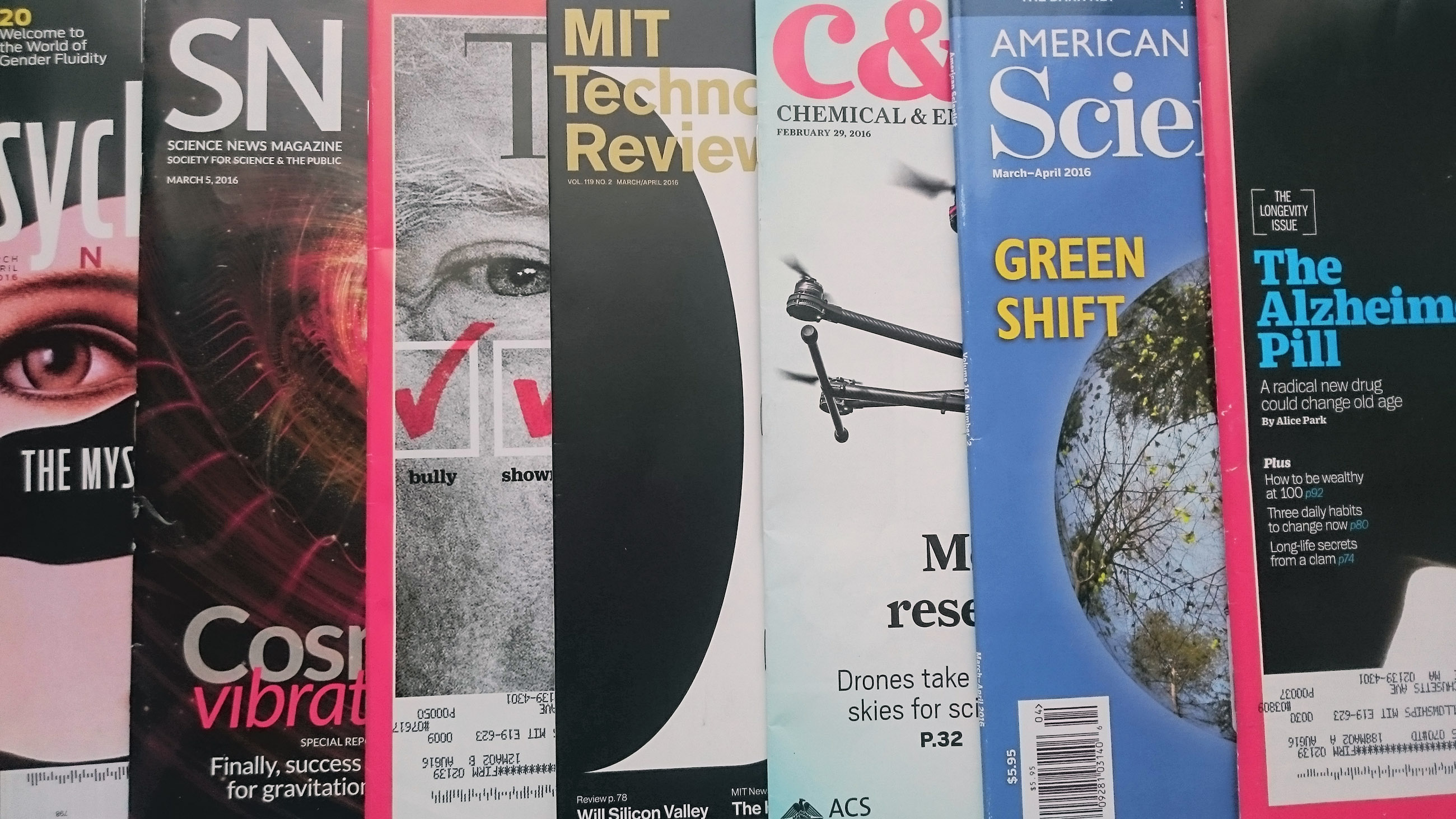The Economics of Being a Young Science Writer
Rebecca Heisman is a 29-year-old science writer living in Walla Walla, in southeast Washington State, a four-hour drive from Seattle. Like many aspiring science journalists, Heisman wakes up to an inbox brimming with email alerts from various scientific journals. And like many freelancers, Heisman scans through those feeds trying to find studies that might be a good fit for the publications she’s successfully pitched stories to and written for, like High Country News, Ensia, Hakai and bioGraphic.
Lately, Heisman has also been getting assignments from editors who know her work, which feels good. “Once or twice now, I have actually been able to go out to the field and interview people in person and tag along in field work,” she says. “I love it.”
But getting stories published – which she estimates happens about once a month – isn’t enough to pay the bills, Heisman admits. To ensure a steady income, she has lined up contract gigs with two ornithology journals, The Auk and The Condor, for which she writes press releases and manages social media channels. “I try to be very transparent with editors that I have this other gig,” says Heisman. “None of the editors that I have worked with have had a problem with it.”
Having to take on this non-journalistic work is the economic reality of young or early career science writers trying to break into journalism, Heisman says. “You do what you can get paid for.”
Which is why she says she was terrified by a debate that erupted during last year’s meeting of the National Association of Science Writers (NASW), of which she is a member, which pitted science journalists against writers of press releases and other public information officers, or PIOs. A pending proposal would amend the organization’s constitution and open up the top leadership positions to non-journalist members — something that is currently forbidden by the rules. The proposal will be voted on this Saturday at the group’s annual meeting.

RELATED: In a pair of essays, Undark’s Tracker columnist and NASW board member Seth Mnookin, and Rick Borchelt, an NASW member and public information officer with the Department of Energy, explain their differing views on the current schism within the organization. Mnookin’s take can be found here.
Borchelt’s is here.
The proposal has angered many journalists within NASW, and several have threatened to leave, citing the conflicts of interest that the change might raise. Press officers and science communications personnel, on the other hand, argue that the lines that used to define these professions are increasingly blurred in the modern era — a reality that they see particularly manifest in many young writers, who are sometimes made to worry whether they risk their reputations and budding careers by doing public relations on the side.
Laura Helmuth, the health, science and environment editor at The Washington Post and the incoming president of NASW, suggests that such concerns are overblown. “As long as the freelance piece is unrelated to any of the writer’s [public relations] work,” she said when asked via email if she would accept story pitches from a writer she knew to be also earning money as a public information officer, “I would happily work with them on a freelance story.
“And by unrelated I mean it couldn’t be on the same subject as their PIO work,” she added, “or involving any of the same institutions.”
Virginia Hughes, science editor at BuzzFeed News, offered a similar assessment.
“If their PIO work had anything to do with the story’s characters, institutions, or subject matter, then I would decline, yes.” Hughes said. “If it was completely unrelated, I’d consider on a case by case basis. I think PIO work really runs the gamut in terms of content, purpose, audience, funding, etc., so the specifics would be important.”
That might be welcome news for many science writers, given that the number of stable, long-term staff jobs at established media companies has been shrinking for years — with science sections in particular shuttering across the country. According to one study, the number of U.S. newspapers with weekly science sections has dropped from 95 in 1989 to 19 in 2013. Digital outlets have been on a hiring spree in recent years, according to Pew research, but there are indications that even this has hit a plateau, and the Bureau of Labor statistics projects a 9 percent decline in journalism jobs over the next decade or so.
Meanwhile, jobs in public communications, in which a writer might work for and represent the interests of research institutions, universities, or government agencies, typically offer higher salaries, extensive benefits, and ample opportunity for growth. The field is expected to grow by 6 percent over the same timeframe, according to BLS.
As such, many freelance science journalists — often describing themselves as deeply committed to the idea of balanced and dispassionate science journalism — say they simply cannot afford to remain forever dogmatic on the finer distinctions of their career paths.
“I love newspapers and, for example, if The L.A. Times or The San Diego Union-Tribune had a bigger science desk, I would have totally considered them,” says Ramin Skibba, a NASW member who graduated this year from University of California, Santa Cruz’s science communication program. “But staff positions at various publications are very competitive and unfortunately a lot of places don’t have budgets for freelancers, or don’t pay very much, or take a while to pay.”
When there’s pressure to find a reliable paycheck, he says, freelancing becomes less and less attractive.
Nonetheless, he says he’s giving science journalism a shot. “It’s hard to break in but I feel like I’m making progress,” says Skibba, who recently found an internship with Nature magazine based in Washington, D.C. Because he has a young child on the West Coast, Skibba convinced Nature to let him complete the second half of his six-month internship at home. He worries he won’t find that kind of flexibility in other science journalism jobs, so he hasn’t ruled out communications work. “At some time down the road, I might consider that,” he says, “especially because I have a baby. I’m interested in journalism, but you gotta feed your family.”
Still, there are young science journalists who say they would rather be poor than write a press release. Kristin Hugo, for example, a 26-year-old graduate of Boston University’s science journalism program, refuses to step into a communications role with an institution, nonprofit or government agency.
“I’ve been lucky enough that I haven’t had to compromise my integrity. I really believe in being non-biased and non-partisan,” she says. “I really, really, really want to continue that. I wouldn’t necessarily begrudge someone for going into [public relations] because there’s money in that, but I’d really like to stay out of it.”
Hugo, who recently completed an internship with National Geographic, is currently interviewing for four different jobs.
Ironically – or symptomatic of the science writing job market – one of them is writing for a nonprofit conservation organization. Needless to say, that job is last on her list.
This weekend at the NASW annual meeting in San Antonio, Texas, members will vote on the proposed amendment that would allow press officers to serve in one of four executive officer roles by striking the following language from the association’s bylaws: “A substantial majority of an officer’s science-writing activities shall be journalism. Officers may not write press releases or otherwise act on behalf of an institution or company to affect media coverage while they serve in office.”
For her part, Heisman doesn’t know which way she’ll vote — or even if she will at all. “[I] don’t have the strong feelings about it that many seem to, I guess,” she says. “I guess that probably makes me sound pretty wishy washy, but it’s not something that will really have an impact on me either way. There’s other voting going on at the moment that actually matters.”
This post has been updated to make clear that the challenges described are faced by both young and early career science writers.











Comments are automatically closed one year after article publication. Archived comments are below.
There’s also an option to write for professional audiences. Some of my writing is just covering basic research for clinicians. It’s still journalism, or at least not PR work, so there’s no conflict of interest there. Great way to find stories that you can work into a general-audience facing publication. And, at least in my experience, professional-facing publications have much more generous pay rates and very reasonable deadlines.
You could remove the word “science” from this article and replace it with any other topic of journalistic inquiry, and it would still be valid.
Here’s some advice for those young science writers trying to pay the bills but worrying about whether taking a job as a PIO for a research institution will corrupt their integrity. When you interview for one of those jobs, ask some particular questions. “If there’s a case of proven scientific misconduct by our researcher, will we be forthcoming and release that information?” “If a researcher’s work leads to the unexpected death of his research animals, will we discuss it fully when asked?” “If we find a researcher has a clear conflict of interest involving their research, and tried to hide it, will we respond openly if a reporter asks?” “If one of our researchers is sanctioned for not abiding by the rules of human subjects research, will we release that information?” “If there is a problem at a research facility, say a BSL3 lab or a campus training nuclear reactor, will we release information quickly and completely?” In my career, when recruited and ultimately offered jobs, I’ve asked these questions and when I didn’t like the answers, I turned the jobs down. Also in my career, when I’ve hired dozens of science writers, I’ve never been asked this type of question, sadly. Hiring and being hired is a partnership, and both parties need to be satisfied with the arrangement. And lest anyone think those questions far fetched, all of those events occurred (some several times) on my watch and we quickly responded openly and honestly. Worrying about one’s integrity is a good thing, but make sure you have answers rather than assumptions when considering a job.
“If there’s a case of proven scientific misconduct by our researcher, will we be forthcoming and release that information?” You mean that if an aspiring science writer ask that kind of question in a job interview, most of the executives doing the interviews will be sympathetic to him or her?
It’s tough to believe that many biz-side execs would tolerate those questions from a newbie job applicant in a PR capacity -but a more senior person with proven chops could have more leeway.
To Pamela and to Pascal: I said upfront that these were questions to ask when being considered for a job as “a PIO for a research institution.” That means a research university or agency like NIH or CDC, not businesses. And if the execs, as you suggest, won’t be sympathetic, then you decide if you want to work for a place that’s not open about what it does. The context of all of this was the ethical quandaries that young science writers may face — sticking with “pure journalism” or accepting a job that requires some degree of marching in lockstep. I understand that many folks are frantic for a job, ANY job! But the discussion is basically one of pitting ethical, transparent actions versus a steady paycheck. All I’m saying is that these questions by an applicant would have pleased me when I interviewed candidates. And when I asked then of senior university leadership that was recruiting me, it told them quickly where I stood on releasing information, and that I was aware of the kinds of issues that research institutions face. People need to have thought about what they will and will not tolerate before they go in for interviews.
” I said upfront that these were questions to ask when being considered for a job as “a PIO for a research institution.” That means a research university or agency like NIH or CDC, not businesses”
Do you mean these are these questions to ask, or these questions that have been asked? Because I have really difficulties to believe we are talking about real-life situations that are already happening today in the PIO world and not theory.
Pascal: Theory? Hell no. All examples from my career. Sorry you find it hard to believe but it wasn’t that hard to live it.